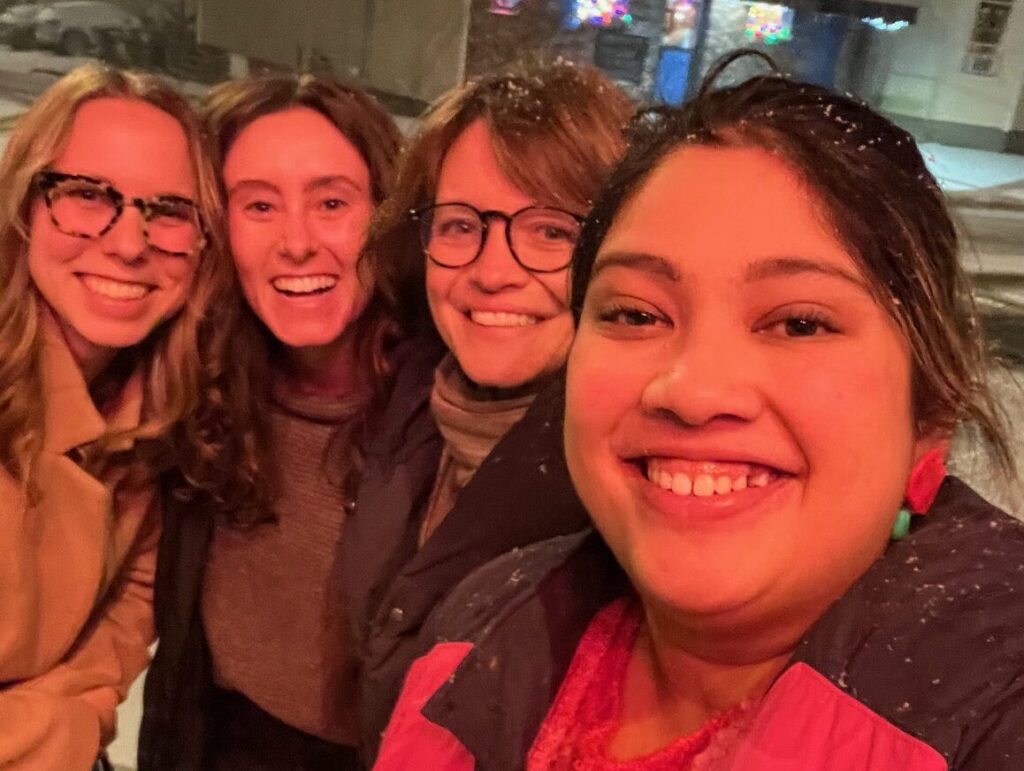
The Maine Morning Star crew (from left to right): AnnMarie Hilton, Emma Davis, Lauren McCauley and Eesha Pendharkar.
As we turn the corner on another year and reflect back on what passed and what may come, I asked my staff to think about the stories that meant the most to them.
Maine Morning Star’s reporters work day in and out documenting the actions and impacts of Maine’s leaders. Sometimes, they have the opportunity to shine a light where there was none, or meet someone who’s lived experience crystallizes the stakes of the debate.
Advertisement
Advertisement
They are devoted to making sure Maine people are better informed — consider this our gift to you — but they are usually learning, as well, and often their greatest lessons make for the most memorable stories. –Lauren
Emma Davis
When I reflect on the past year covering the Maine Legislature for the first time, I think about the parts of the lawmaking process that aren’t necessarily flashy or headline grabbing.
I think about following each step of the deliberations for two competing data privacy proposals that legislators on both sides of the aisle described as the most intense and lengthy of their tenures, and the non-partisan staff that made it all possible. And I recall the broader picture that emerged later, when I dove into the money and Big Tech’s influence on the plans.
I think about the most substantive change to the Maine Indian Claims Settlement Act since it was signed in 1980, but also how different the final law looked from the initial proposal and how that one change came after years of attempts at more sweeping reform.
Advertisement
Advertisement
Some bills succeeded, such as the tribal sovereignty bill, although in a pared back form. But for others, like the data privacy proposals, the hours of work didn’t result in a new law.
And sometimes, often, the public may get every indication that legislation is on track to become law but in the end it doesn’t. And even to those closer to the action, it’s not obvious why. As Maine Sen. Rick Bennett (R-Oxford) told me, “People are scratching their heads, like, what happened?”
This is because of a part of the funding process that allows bills to die a quiet death.
We at Maine Morning Star followed several bills through every step of the lawmaking process, from introduction, deliberations and amendments in committee, committee passage, floor votes and so on. The “so on” is key, and here’s why.
Advertisement
Advertisement
More in U.S.
Bills can pass both chambers, but if they’re not explicitly funded in the state budget, lawmakers place them on what’s called the “appropriations table” to vie for unappropriated money. That said, even inexpensive bills or bills that require no funding can land on this table, and die by way of it.
While I had closely tracked several bills that ended up on the table — proposals to create an African American and Wabanaki studies advisory council, formalize the renaming of places through a designated state board, establish a unit to enforce violations of the Maine Civil Rights Act, among others — the overall picture was still very unclear.
While the Legislature will produce point-in-time lists of bills throughout the session, it doesn’t publish a total list of all legislation that has landed on the table, nor what the ultimate outcome is for each of those bills.
So I committed to tracking each step of the Appropriations and Financial Affairs Committee to get that full picture. Last year, at least 250 bills were placed on the table. Not counting a few measures incorporated into the budget, just 21 of those bills were funded and actually become law.
Advertisement
Advertisement
Even knowing that, the reason why bills die can be convoluted. A lawmaker can support a bill in floor votes but decide to leave it on the table, knowing it is a place where that legislation could die without having to state their opposition publicly. Critics of this process have raised concern about that lack of accountability, and many lawmakers are hoping for rule changes this session.
We’ll have to see what happens there, and I’ll be eager to continue to walk you through the deliberations and nuances, as nothing is ever as black and white as it seems.
AnnMarie Hilton
Summing up the nearly 300 stories I wrote this year feels next to impossible. But they took me from a reporter who had never covered a legislative session to one who knew the best spots in the House gallery and the LD number for every piece of gun legislation.
Those first few weeks of covering the Maine Legislature felt like how I imagine it would feel to drink from a firehose. There was legislative lingo coming out of my nose, or so it felt. Early on, most of my time was spent with the housing committee, learning about what the people sitting in Augusta were planning to do about shelter funding and a proposed constitutional right to housing.
Advertisement
Advertisement
The beginning of the session is also when I learned about the state’s troubled child welfare system. I didn’t know what to expect when I was assigned to the Legislature’s Government Oversight Committee, but covering the group’s review of the Office of Child and Family Services was a responsibility I didn’t take lightly knowing the little lives that were at the center of each conversation.
The hours I spent listening to those meetings sparked some of my most noteworthy accountability stories such as one about how a buggy software system meant to improve the child welfare system was reportedly making it worse.
Now, back to those gun bills. Since I was covering the commission tasked with investigating the Lewiston mass shooting, it felt logical for me to cover the legislation that was introduced in light of the event. I’ll never forget watching Arthur Barnard, whose son, Arthur Strout, was one of the 18 people killed in the October 2023 shooting, stand with lawmakers for a press conference introducing a slate of bills that he hoped would prevent such a tragedy from happening again.
Covering the Lewiston shooting will always be a significant part of my career. It taught me a lot about my adopted home state and about the people who share it with me. When the anniversary rolled around, I asked lawmakers to reflect on the responsibility they bear in moments of tragedy like that.
Advertisement
Advertisement
This summer, I passed the housing reporting baton off to Eesha Pendharkar, who has already done a fantastic job, and turned my attention toward environmental and climate coverage. Though I was already covering agriculture and the state’s budding offshore wind industry, I quickly learned there is no shortage of stories to tell about energy, climate goals and even food waste.
My midwesternness was certainly showing when I ran around Sears Island in May looking for the sand dune that caused a hiccup in the state’s plan to build an offshore wind port. But I enjoyed the opportunity to learn more about the community, its history and the people for whom offshore wind isn’t just about clean energy goals, but about a paycheck and being able to afford to stay in the place they call home.
There were also many, many stories I wrote leading up to, during and after the Nov. 5. election. Election coverage is important and truly a labor of love. Never before have I parsed through 550 roll call votes. It pushed me as a reporter to learn about campaign finance and cover at least half a dozen debates, but I hope it left readers feeling more informed at the polls.
Two hundred and eighty some odd stories in one year and I feel like I’ve only scratched the surface of what there is to report on in Maine, but I’m thankful for the chance to keep track of everything from which jacket U.S. Rep. Chellie Pingree wears (and more importantly, why) and what lawmakers are going to do about all the food that ends up in Maine’s landfills.
Eesha Pendharkar
Before I started working at the Maine Morning Star, I had been immersed in education reporting at the national level for a few years, and was looking forward to the opportunity to be in the communities I reported on, and take on a few more beats I’ve always been interested in, such as criminal justice, housing and health care.
Advertisement
Advertisement
Over the past few months, I went from feeling like an expert in interviews about K-12 schools to beginning my conversations with sources with questions like, “Can we start with you explaining Medicaid to me?”
My favorite part of reporting is that we get paid to learn more about the world, so immersing myself in something new has been truly rewarding, and while I’ll always be an education reporter at heart, my favorite stories this year were not about our public schools or colleges.
What started with an emailed tip (initially sent to reporter Evan Popp, who I replaced when he went to law school) in my first week on the job turned out to be a monthslong look into syringe service programs, the tensions with the municipalities they operate in, and how the people they serve are caught in the middle as a result of this conflict. My favorite aspect of the story was watching the interactions between the providers and program participants, and how much they appeared to be a true community, looking out for each other.
While many people who participate in the program are unhoused, one person who had found housing returned to the day of the pop-up syringe exchange to visit their friends.
Advertisement
Advertisement
“Homeless people have more friends than you or me,” one of the program managers told me, and I realized that often we write about homelessness without talking to or thinking about what the experience of homelessness must be like, and more importantly, the support these people have to find within their encampments when they often lack it beyond.
Which leads me to my second favorite story, which was part of a national series on camping bans and homelessness with our parent organization, States Newsroom.This time I went to Lewiston for an in-person interview with a city councilor, but ended up spending a few hours shadowing unhoused people shuttling their belongings from a day center to the public library, then later waiting around in a snowy public park for the warming center to open. At the end of that day, I was able to drive home with the heat blasting and retreat to my apartment, but the feelings of frustration and displacement from those few hours will not leave me.
SUPPORT: YOU MAKE OUR WORK POSSIBLE
EMEA Tribune is not involved in this news article, it is taken from our partners and or from the News Agencies. Copyright and Credit go to the News Agencies, email news@emeatribune.com Follow our WhatsApp verified Channel




